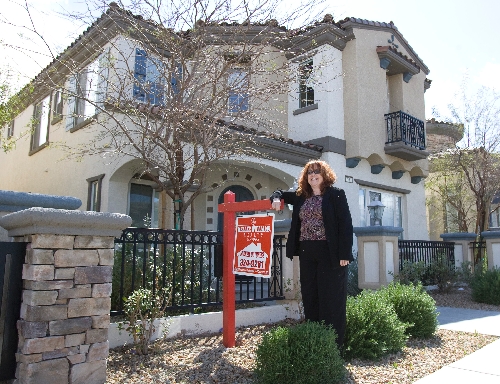Government’s short-sale aid implemented
A government program that went into effect Monday is expected to speed up the short-sale process and prevent lenders from filing deficiency judgments against home sellers, a move that could go a long way toward mitigating the foreclosure crisis in Las Vegas, real estate industry sources said.
The Home Affordable Foreclosure Alternatives, part of the Obama administration's $75 billion Making Home Affordable program, sets guidelines that would streamline the process and provide incentives to both borrowers and lenders to avoid foreclosure.
It will bring much-needed relief for the estimated 70 percent of Las Vegas homeowners who are caught with negative equity, owing more than their houses are worth, Randy Bridges of Realty One Group in Las Vegas said.
They've been struggling with banks to approve short sales, or the sale of a home for less than the mortgage balance owed. The process can take months to complete, making it frustrating for everyone involved, Bridges said.
"This is the government's way to kick lenders in the butt to get them going and get them to abide by these guidelines," Bridges said. "This would be a good opportunity for our elected officials to restore the confidence that has been lost recently."
HAFA stipulates that the bank has forgiven the mortgage debt in a short sale and cannot pursue a deficiency judgment for the difference. Aside from that, the best part of the program is that lenders have 10 days from the date a short-sale offer is submitted to get back to the seller with a decision, Bridges said.
"That is outstanding," he said. "It's huge. I don't think it'll work, but we'll give it a try."
Despite the implementation of the Home Affordable Mortgage Program in March 2009, Nevada continues to lead the nation with one out of 19 households in foreclosure, Irvine, Calif.-based RealtyTrac reports.
More than half of borrowers who received loan modifications under HAMP in first quarter 2009 have defaulted again after nine months, the Office of the Comptroller of Currency and Office of Thrift Supervision reported.
HAFA is designed for homeowners who are in financial trouble but don't qualify for the Obama administration's $75 billion mortgage modification program.
Realtor Bonnie Grant of Re/Max Elite said she looks forward to seeing whether the program will expedite short sales. It gives $1,500 in cash incentive to the homeowner and $1,000 to the bank.
"The banks have a certain time frame that they will have to give an answer on the short sale," she said. "In the past, they took their sweet time and by the time they gave an answer the buyer was long gone and they would proceed with the foreclosure."
HAFA's financial incentives will help make the short sale happen for property owners and lenders, especially second-lienholders, said Michele Dutchess, certified short-sale and foreclosure agent with Keller Williams Realty in Las Vegas. Many short sales fail because of some last-minute disagreement, she said. HAFA sets clear expectations on all sides.
"I am hearing good things about the program in general," Dutchess said. "I personally think that participation and cooperation are the key to us all getting through this and it is high time that the lenders are being made more accountable to help consumers get out of this crisis so they can become whole on a quicker time line."
It could take 20 years for homeowners who bought at the peak of the bubble to fully recover their lost equity, Las Vegas housing analyst Larry Murphy said in January. A home purchased for $300,000 in 2006 has lost about half its value, or $150,000. In general terms, that's 20 years at 5 percent annual appreciation, he said.
"Given that the average homeownership period is well less than that, the owner and the lender never get out without a loss," said Mark Affeldt, a 20-year banker in Las Vegas. "But should the bank really be responsible to absorb all the loss? And does everybody recognize that for any bank to forgive book value of its assets, capital levels are negatively impacted? Weak capital levels cause banking regulators to impose any number of operational restrictions."
Rick Simon, spokesman for Bank of America Home Loans, said the lender was on board early with HAFA and has been gearing up for an expected onslaught of calls. As letters for loan modification decline go out to homeowners, Bank of America starts the process for HAFA, sending out solicitation letters within a couple of weeks, he said.
"We believe this is very similar to the program we started piloting just before the administration announced its program, which was based on the same idea," Simon told the Review-Journal. "Once we have exhausted all of our home retention solutions, we would use the information already collected to go through the pre-approval process and start a short sale process and have all the information up front rather than collect it at the time the offer is made."
CitiMortgage public affairs director Mark Rodgers said the lender helped 825,000 borrowers stay in their homes and avoid foreclosure on mortgages totaling nearly $98 billion since the beginning of the mortgage crisis in 2007.
"CitiMortgage is supportive of the HAFA program, but it is too early to project how much of an impact it may have," Rodgers said. "Based on investor guidelines, we will approve borrowers for short sales if they have indicated they no longer wish to retain the property as a viable option to foreclosure."
David Brownell of Keller Williams Realty reported 4,823 short-sale listings in February, or nearly 48 percent of the total inventory, compared with 35 percent in the same month a year ago. There were 694 short sales during the month, nearly one-fourth of the 2,957 total sales. That's up from 8 percent a year ago. More than 10,000 short sales are pending, or waiting for approval, he said.
Contact reporter Hubble Smith at hsmith@reviewjournal.com or 702-383-0491.
Provisions of Home Affordable Foreclosure Alternatives
■ Complements the Home Affordable Mortgage Program by providing a viable alternative for borrowers (the current homeowners) who are HAMP eligible but nevertheless unable to keep their home.
■ Uses borrower financial and hardship information already collected in connection with consideration of a loan modification.
■ Allows borrowers to receive pre-approved short sales terms before listing the property (including the minimum acceptable net proceeds).
■ Requires borrowers to be fully released from future liability for the first mortgage debt (no cash contribution, promissory note, or deficiency judgment is allowed).
■ Uses standard processes, documents and time frames/deadlines.
■ Provides the following financial incentives: $3,000 for borrower relocation assistance; $1,500 for servicers to cover administrative and processing costs; up to $2,000 for investors who allow up to $6,000 in short sale proceeds to be distributed to subordinate lien holders, on a 1-for-3 matching basis.
■ Requires all servicers participating in HAMP to implement HAFA in accordance with their own written policy, consistent with investor guidelines. The policy may include factors such as the severity of the potential loss, local markets, timing of pending foreclosure actions and borrower motivation and cooperation.




























